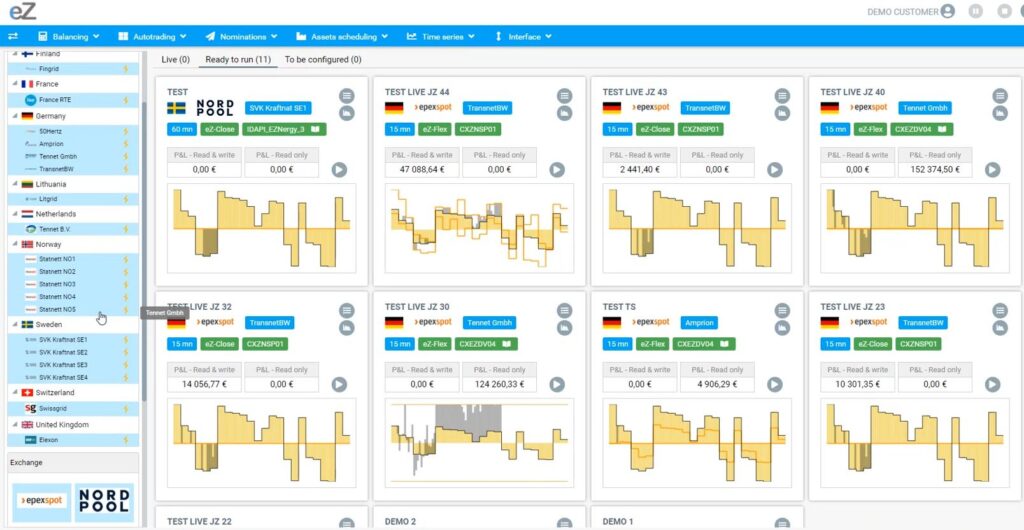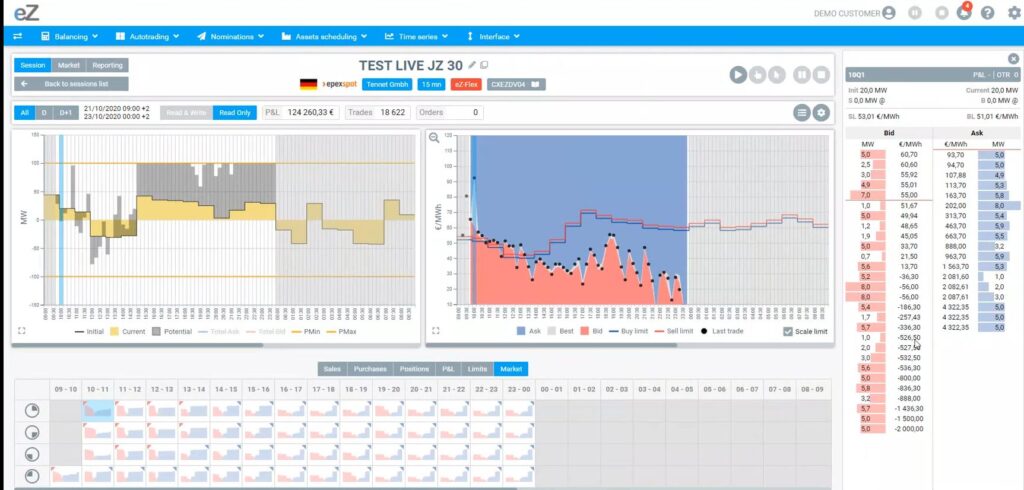The energy market is going through a period of immense change. New technologies, increased decarbonisation and the growing digitalisation of the sector have created a sizable demand for short-term, intelligent position management for energy trading companies. As a result, many commodity traders are looking to algorithmic energy trading platforms to deliver intelligent, flexible and automated solutions.
Algorithmic energy trading refers to the use of computer algorithms and mathematical models to execute trades in energy markets. These algorithms use historical and real-time market data to make trading decisions based on predefined rules and parameters. The goal of algorithmic energy trading is to automate and improve the efficiency, reliability and eventually the profitability of your business model. It concerns all energy market participants.
For instance, Balance Responsible Parties (BRP) or energy producers with spare capacity will use algorithmic trading to minimize their imbalances or take decision to increase or reduce production more efficiently while taking into account price strategies. Trading firms on the other side will use algorithmic trading to maximise profits by taking advantage of market inefficiencies and price discrepancies. This method of trading has become increasingly popular in recent years due to its ability to quickly analyse large amounts of data, execute trades at high speeds, all the while improving reliability by removing human error.
Algorithmic energy trading vs traditional trading platforms
Algorithmic energy trading platforms analyse vast amounts of information, such as real-time market data, energy supply and demand forecasts, weather patterns and geopolitical events to identify profitable trading opportunities.
These algorithms can process information at speeds that are impossible for humans to match, enabling traders to make faster and more accurate trading decisions. The algorithms can also adapt to changing market conditions and adjust trading strategies accordingly, maximising profits while minimising risks.
By automating the trading process, algorithmic energy trading platforms can operate 24/7, ensuring that trades can be executed at any time, even when traders are not available. Some market areas also feature a great number of contracts to be traded & monitored at the same time. For example in each German zone there can be up to 96 contracts for any given day. Using algo-trading tools to monitor all of these contracts simultaneously allows the professional trader to focus on the areas where intervention or finetuning is required.
In contrast, traditional trading methods rely on manual decision-making processes that are prone to error and inefficiency, making algorithmic energy trading software an attractive alternative for the modern trader.
Increased profitability
Algorithmic energy software can help commodity trading companies to react more quickly to changes in the market and to increase profitability in a variety of ways, including:
- Platforms can be programmed to identify and take advantage of profitable trading opportunities automatically, without the need for human intervention
- Algo-trading allows energy companies to balance their portfolio at any time and to avoid high imbalance fees
- Algorithmic trading software offers reduced costs and increased efficiency compared to traditional trading methods

Lighter workload
One of the greatest advantages of algorithmic trading software is its ability to analyse vast amounts of data in a very short space of time, allowing traders to benefit from opportunities in many markets and maturities at the same time. By automating tasks such as preparing and posting bids, algorithmic trading solutions can significantly reduce the amount of time spent and minimise human input.
Reduced risk
Algorithmic energy trading can reduce risk by minimising the potential for human error and taking advantage of real-time data. The solution automates the execution of trading strategies while processing large amounts of data. This approach eliminates the emotional and cognitive biases that can affect human decision-making, leading to more objective and rational trading decisions.
Additionally, the software can continuously monitor market conditions and adjust trading strategies in real-time, allowing it to react quickly to changing market conditions and minimise the potential for losses.
What does the future hold?
Looking forward, the use of algorithmic energy trading is likely to increase as it allows for better monitoring and control of positions and portfolios, which is a growing regulatory concern. It can also enable commodity trading firms to better navigate increasingly volatile markets and manage the unpredictable nature of (renewable) energy production and consumption patterns, resulting in more accurate risk assessments and faster trade execution.

Energy One is a provider of software products and services to wholesale energy, environmental and carbon trading markets around the world. It supplies a range of products to support commodity trading including algorithmic energy software solutions to automate and scale energy trading. Don’t hesitate to get in touch with our team if you would like a demonstration of our algo-trading, auction-bidding and power and gas nomination and balancing solutions.


